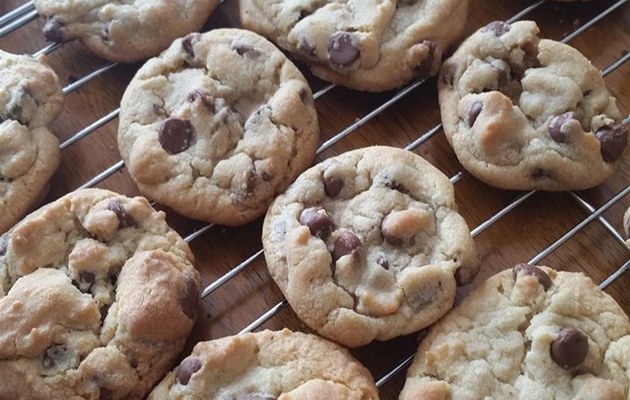Ingredients
While using correct ingredients
is key when
cooking cookies.
For the best results,
follow the recipe closely and
calculate ingredients carefully.
Fats, Fats play
a significant role
within the spread
of a cookie¨Cwhether a cookie keeps its shape or flattens
in the oven.
In general, more fat equals flat, crispy cookies while less fat equals puffier, cake-like cookies.
Cookies
created using butter
tend to spread out. Butter
is important in certain cookies,
for example shortbreads;
when they don't hold their shape, consider
lowering the amount of butter, sugar, or
baking soda in the recipe.

Flour
also affects how cookies behave. Most cookie recipes
call for all-purpose or pastry flour. Both bread flour,
with its high protein content, and cake flour,
which is high in starch, produce cookies that
have a tendency to spread less. Higher flour-to-liquid ratios
are essential in shortbread and crumbly-textured cookies.
Baking Powder and Baking Soda
Baking powder and
sodium bicarbonate are the two
most common leaveners in cookies.
Baking soda is merely bicarbonate of soda, while baking
natural powder is really a combination of bicarbonate of soda plus
product of tartar, an acidic ingredient.
Baking soda neutralizes the acidity
with the dough, allowing the cookies to brown
within the oven. Since baking
natural powder already contains
its very own acid,
it will not reduce the acidity
in the dough,
and the resulting cookies
will be puffier and lighter
colored.
Sugars.
Eggs and Liquids
Eggs
are a binding agent. Liquids
can either cause cookies to puff up or spread. If egg
may be the liquid,
it'll create a puffy, cake-like texture.
Just a tablespoon or
two of water
or other liquid
will help your cookies spread into
slimmer and crisper
models. Egg yolks bind the dough and add
wealth but allow a crisp
consistency after baking, whereas
egg whites makes cookies dry and cakey.
To create up
for your drying
aftereffect of the
egg-whites, extra sugar
is usually added.
That's why cookies made with just
egg whites usually are so sweet¨Cthink of macaroons.
Mixing
Cookies
are not as delicate as cakes, but proper mixing
is still important. Some recipes
require a creaming
part of which the fat and
sugars are beaten
with each other until light-colored and
cosy. Other cookies
need a sandy texture,
so the fat is reduce the flour. Over-mixing
can easily incorporate too much air
in to the dough,
leading to flat, overly spread-out cookies.
Stick to the recipe
directions.
Once you combine the dry and wet
components, mix until just combined.
Equipment and Baking
Different baking sheets and ovens produce different results. Thin baking sheets might allow the bottoms to brown too fast. Special insulated baking sheets allow air movement and help cookies bake evenly, but they can be expensive. Semi-thick rimmed baking sheets¨Calso called jellyroll pans¨Care available just about everywhere, and are a fine multipurpose baking choice. Rather than greasing each baking sheet, consider investing in a roll of parchment paper or a nonstick pan liner to make cookie removal and clean-up easy.

2016-07-01 11:41:36